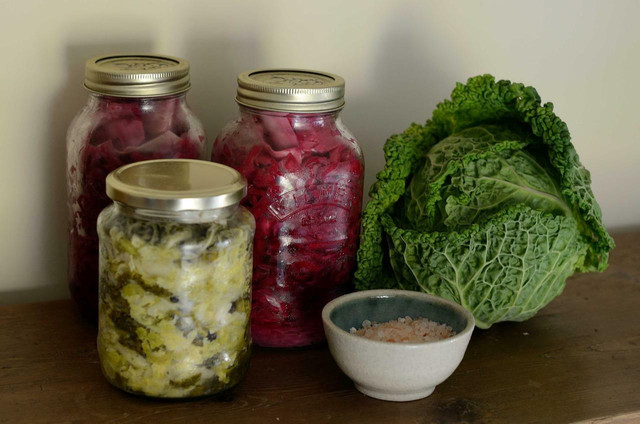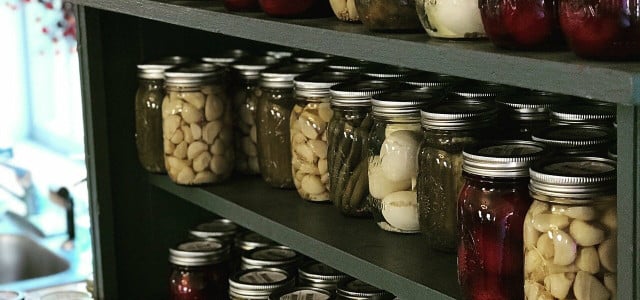Can you freeze sauerkraut? Read on to find out the difference between canned and fresh sauerkraut, plus several tips for freezing fermented cabbage.
Sauerkraut is a German term for fermented cabbage. Fermentation has been used for a few thousand years in order to prolong the life of food. It can also alter the nutritional value of some foods and is a delicious way for us to incorporate healthy bacteria or probiotics into our diet which are crucial for good digestion. Sauerkraut is often used as a sandwich filling or added to hearty soups and stews, but if the recipe you are using doesn’t use the whole container, what do you do with the rest?
Can you freeze sauerkraut? If fermentation extends the shelf life of cabbage by turning it into sauerkraut, why would you need or want to freeze it? Will freezing sauerkraut negatively affect the flavor, texture or nutritional value of the fermented food? Does it make a difference if your sauerkraut is fresh or canned? Read on to find out if you can freeze sauerkraut.
Fresh vs. Canned Sauerkraut



Sauerkraut is made by a traditional process of pickling called lactic acid fermentation. Cabbage is simply shredded and layered with salt and the naturally occurring lactobacilli present on the cabbage leaves will start the fermentation process, and no heat is needed for this.
There are essentially two main types of sauerkraut available — fresh and canned.
- Fresh sauerkraut is found in the chilled section in the grocery store, and is also the type that you could make at home. Because the traditional pickling process does not use any heat, the lactobacilli continue to thrive and therefore continue to ferment the cabbage. This process is slowed down (but not stopped) by refrigeration. Fresh sauerkraut will be filled with probiotics and gut-healthy bacteria. Fresh sauerkraut will last for a few months in the fridge once it has been opened, so long as the cabbage is submerged in the brine and clean utensils are used when serving from the jar. Of course fresh sauerkraut can go bad – look out for fine white mold on the top or a very foul smell to the cabbage. If in doubt, throw it out.
- Canned or jarred sauerkraut will be found in the canned goods or preservatives section of the grocery store. This is because it has been pasteurised. Pasteurization is a process in which certain foods are subjected to heat. This is usually done to extend the shelf life of a product, and to kill any harmful bacteria that may cause illness. Unfortunately, this also has a negative effect on fermented foods like sauerkraut, because you can’t isolate good bacteria from bad bacteria. Pasteurized sauerkraut will not have the health giving probiotics as fresh sauerkraut because the active bacteria will have been killed during the heating process. Canned sauerkraut will last for months on the shelf (just keep an eye on the use by date), but once opened, it will only keep in the fridge for just less than a week.
Can You Freeze Sauerkraut?



So can you freeze sauerkraut? Yes, you can freeze pretty much anything, but before you do, ask yourself why? The good news is that the flavor and texture of sauerkraut isn’t really affected by freezing and thawing, regardless of if it was fresh or pasteurized. The bad news is the good bacteria is affected.
We know that heat will kill the good bacteria present in sauerkraut, and unfortunately freezing will do the same thing. Without the living bacteria, we lose many of the health-giving benefits of sauerkraut. Because pasteurized or canned sauerkraut has already lost a lot of its probiotic benefits to heat treatment, then freezing it won’t really affect its overall healthy properties. Freezing fresh sauerkraut on the other hand will destroy the living bacteria, negatively affecting its nutritional benefits.
Tips For Freezing Sauerkraut
Generally speaking, if you have stored your fresh sauerkraut well, you shouldn’t have any need to freeze it. Of course if you have made use of a glut of cabbages and have made more sauerkraut than you could manage to consume, then freezing it could be less wasteful. Canned sauerkraut is a great contender for freezing as it will help to reduce waste. If you have an open jar of pasteuerised sauerkraut that you know you won’t be able to finish before it goes bad, then freezing the rest for later is an excellent idea.
Fresh or canned — follow these simple tips for best results when freezing sauerkraut:
- Always use a clean, freezer safe container with a lid to prevent freezer burn.
- Try to eliminate as much air as possible from the container.
- Leave an inch or so between the top of the sauerkraut and the lid to allow for expansion as it freezes.
- Don’t drain the sauerkraut – freeze the brine too.
- For ease later on, freeze it in portions. Try using an ice cube tray, and transferring the portions into a freezer container for later.
- Always label the container with what’s inside, how many portions and the date. Properly frozen sauerkraut should last at least eight months.
- When you are ready to eat, defrost the desired amount in the fridge overnight. If you are adding sauerkraut to a soup or stew, you can add it straight to the pot from frozen, just heat through properly.
Read more:
- 10 Easy-to-Digest-Foods – And Which to Avoid
- 2 Ingredient Vegan Kefir Recipe
- Can You Freeze Cupcakes? Yes, Here’s the Best Way to Do It
Important Information regarding Health-related Topics.
** Links to retailers marked with ** or underlined orange are partially partner links: If you buy here, you actively support Utopia.org, because we will receive a small part of the sales proceeds. More info.Do you like this post?









